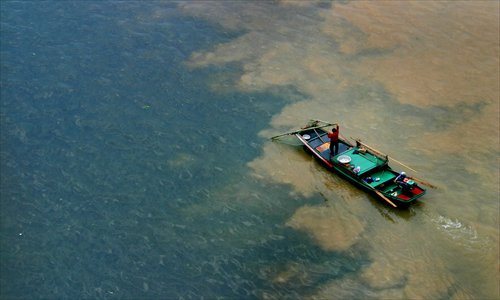All fished out


Just a few years ago, Zhou Licheng, now 38, spent more than 1 million yuan ($160,960) establishing a fishing cooperative in Zigui county, Hubei Province. For the time being at least, he still has 122 members, but things are looking bleak. "Our fishermen now concentrate more on catching shrimp instead of fish, since many of the once common fish species in the river, such as trout and catfish, are hardly ever seen nowadays."
Ominous times have arrived for fishermen along the Yangtze River. Despite the fact that the 10 provinces and municipalities along the waterway have instituted seasonal bans on fishing every year since 2002, fishing resources in the river continue to dwindle, putting fishermen's livelihoods in doubt. Worse still, the river may be beyond repair. In the words of Zhao Yimin, a director with the Yangtze River fishery resources management committee office within the Ministry of Agriculture, "The ecological balance of the river has already collapsed."
Devastated ecology
The Yangtze River has more than 160 fish species that are unique to the river, but more than half of them haven't been spotted in recent times, according to Zhao's research. He said that although the environment of the river has been devastated, measures should be taken to protect what's left.
However, "what's left" is very little.
The catch of fish from the river shrank from 540,000 tons in 1954 to 100,000 tons during the past few years, representing less than 1 percent of the country's whole fresh water fishery output, the Oriental Morning Post reported.
Zhao said there are around 150,000 fishermen working on the river, and despite the fact that the number has been decreasing in recent years, the fishery resources in the river can't sustain modern fishing techniques, which put more stress on the ecosystem.
These techniques mean that moratoriums aren't working because once they are over fishermen are able to locate and fish unsustainable quantities of stocks, Zhao Jindong, a researcher from the Institute of Hydrobiology under the Chinese Academy of Sciences, told the Global Times. In 2011 and 2012, he took a proposal to the Chinese People's Political Consultative Conference suggesting that fishing on the river should be banned entirely for a 10-year period. The Ministry of Agriculture is still discussing the proposal and not much progress has been made.
No fish, no fishermen
When asked about a fishing moratorium that would last 10 years, Zhou commented that it would be a good project for the Yangtze River, but expressed doubts over whether fishermen would be able to survive that long.
He said the average fisherman in his cooperative makes between 20,000 to 30,000 yuan a year as well as a share of a 6,000 to 7,000 yuan subsidy that is given to each boat. There are fuel subsidies and living allowances during the moratorium period, when most of the fishermen have little to do.
The lack of fish has already driven some to quit their jobs to become street vendors, but many still cling to their careers as fishermen, Zhou said. He admitted that it was possible more fishermen would change job voluntarily if government subsidies were withdrawn. "Some of us can make ends meet by just doing odd jobs and being subsidized," he said. "They would not easily give up their identities as fishermen."
Implementing a 10-year moratorium would be good for the preservation of fishing resources in the Yangtze River, but there would be consequences as making suitable arrangements for fishermen would be a complicated project, Li Jiale, a professor with Shanghai Ocean University, told the Global Times, adding that the lack of fishing resources is the result of not just overfishing, but also environmental pollution and the construction of dams.
"It may be easier for affluent areas, for example, Shanghai, to tackle," he said. "But in poorer areas, such as the north part of Jiangsu Province, which has nearly 20,000 fishermen, how can they afford to do it? Should the central government or the local authorities fund the project? Making arrangements will be complicated."
Li said that a better way to cope with the problem would be to encourage fishermen not to hunt juvenile fish and promote the consumption of fish raised in farms.
A government solution?
Some fishery agencies at the local government level have already made this career transition a priority. The fishery department in Laohekou, Hubei Province, for example, has set up training courses to train fishermen in skills for other occupations. The department also provides them with information on job vacancies.
A staff member surnamed Qin from the office of the Laohekou fishery department told the Global Times that they want to help the fishermen hunt for short-term jobs during the fishing moratorium starting from Monday, but they would prefer to see the fishermen find more permanent jobs.
"Reducing overfishing and environmental pollution on the river is recognized as a priority and we no longer approve new boats," he said. "The government hasn't issued policies to help transfer fishermen into new jobs. We can only encourage these fishermen step by step."
Issuing a broad policy from the central government would be a difficult task, Zhao Yimin told the Global Times, adding that it would be almost impossible to verify the backgrounds of all fishermen, since some might have boats but not rely on them to make a living.
He explained that because fishermen get fuel subsidies from government, those who do not fish at all still claim to be fishermen because they have boats.
"Regional disparities are another barrier for central policy-making," he said. "Transferring these jobs needs funding from local governments, but living standards vary from place to place. Distributing the costs poses problems."
Costs remain on Zhou's mind as well, but he is determined to persevere. "Running the cooperative may get tougher in the near future as fish become fewer, but I still want to keep it, at least until I recover the costs I spent."